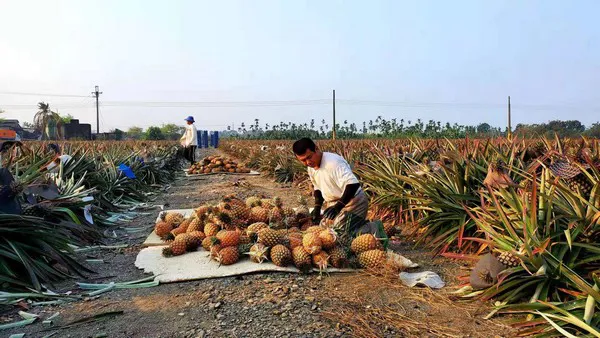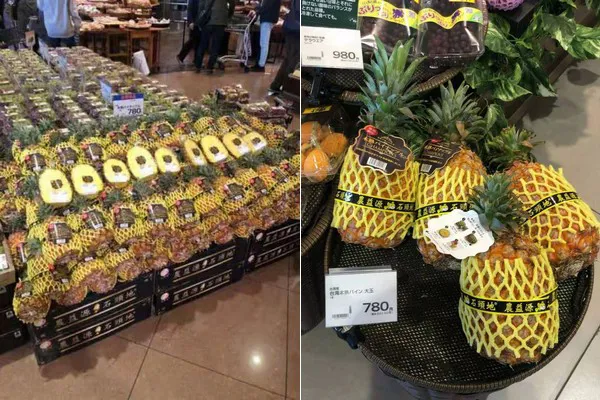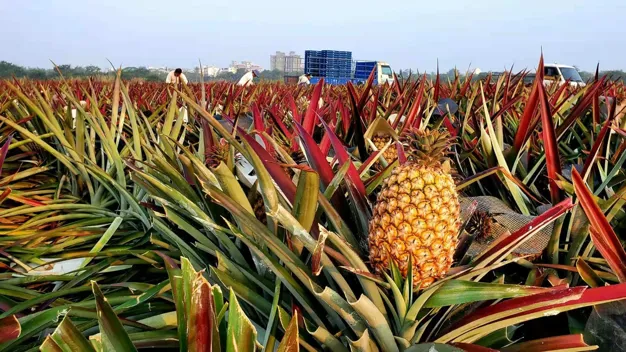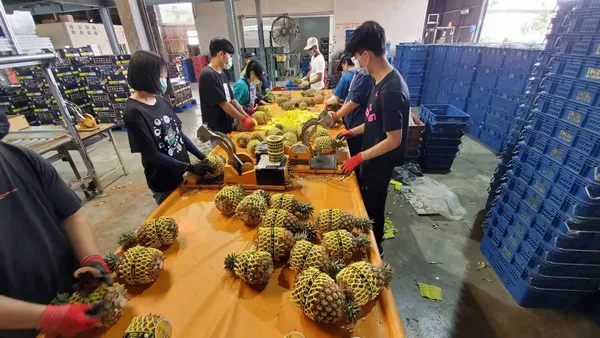Taiwanese pineapple exporters have set their eyes on the Japanese market ever since the General Administration Customs China (GACC) announced a temporary ban on the import of Taiwanese pineapples. However, investigations into who had responsibility for the recent 'Ever Given' incident on the Suez canal and the financial losses it caused for many global companies, have given rise to heated online debates.
The Ever given is owned by Japanese company Shoei Kishen Kaisha, but operated by the Taiwan-based Evergreen Marine. Media reported a decline in the Japanese import volume of Taiwanese pineapples. Mr. Lin, spokesperson for Taiwanese pineapple brand 'Stone Earth', recently talked about current developments in the Japanese market for Taiwanese pineapples.

Taiwanese export to Japan is regular
Mr. Lin briefly explained the conditions in the Japanese market for Taiwanese pineapples. "Japan is the second-largest export market for Taiwanese pineapples. Although the export volume to Japan is not as large as the export volume to China, Taiwan still has a well-established presence in the high-end pineapple markets in Japan. And market demand is growing every year. Export to Japan has to go through the chamber of commerce, unlike export to China. However, because the Taiwanese pineapple export to China was suddenly interrupted, many exporters have had no time to prepare for other sales channels. Still, the market is shifting towards Japan. In addition, local traders and supermarkets are able to absorb some of the export pineapples originally destined for the Chinese market."
The recent 'Ever Given' incident sparked online debate over the responsibility for this transport disaster. "Some online media reported a decline in Japanese import of Taiwanese pineapples, but as far as we can see these reports are unfounded." Mr. Lin explained, "Japanese market demand for Taiwanese pineapples remains strong, and we deliver as usual."
"However, the product quality of some of the Taiwanese pineapples in Japan and Singapore declined because of poor weather conditions. The fruit peel remained green for longer than usual and the flavor was somewhat sour. Some fruit traders had to throw away part of their pineapple stock. That is why Japanese and Singaporean fruit traders lost some of their confidence in Taiwanese pineapples, and that is why the import volume slightly declined. But we have not heard from anyone in the industry that the 'Ever Given' incident had an impact on the pineapple trader between Taiwan and Japan."

Price of Hainan and Guangdong pineapples fluctuates
According to Mr. Lin, the Jinzuan pineapple is one of the most important pineapple varieties researched and cultivated in Taiwan. The peak period of the Jinzuan pineapple harvest season begins in February and continues until June. The Jinzuan pineapple is famous for its tender fibers and rich fragrance. Furthermore, the flavor is excellent and waste is minimal. Chinese consumers appreciate the Jinzuan pineapple for its taste, fragrance, and flavor. The Jinzuan pineapple is an improvement on the MD2 pineapple variety and consumer demand grows every year. Many farmers in Hainan and Guangdong are shifting from other pineapple varieties to the Jinzuan.
Mr. Lin explained that: "This pineapple variety has a flavor that other pineapple varieties simply can not match. Chinese consumers who love Taiwanese Jinzuan pineapples will undoubtedly first look for Jinzuan pineapples from Hainan and Guangdong. Market demand in the last month exceeded the supply volumes from Hainan and Guangdong, and so the price went up."
"Some Chinese traders who have not been able to secure a supply from Hainan and Guangdong are now turning to the Philippines, Costa Rica, and Panama. However, these countries primarily grow MD2 pineapples. These are not as sweet as the Jinzuan pineapple, and their product quality is not as stable. Furthermore, the fibers are coarse and the pineapple core is inedible. They do not match up with the Jinzuan pineapple in terms of flavor, fragrance, or fibers. The Chinese market is not as fond of MD2 pineapples as Jinzuan pineapples. Still, the MD2 pineapples from the Philippines enjoy superior conditions compared to MD2 pineapples from Latin America because the Philippines is closer to China and the shipping time shorter."

Supplying top-quality pineapples shows respect for the market
"Despite the temporary export ban for the Chinese market, the Taiwanese pineapple industry maintains high standards. Taiwanese pineapple farmers raised the level of plantation technology and won the respect of their clients. That will help the industry weather this storm," said Mr. Lin. "Take the 'Stone Earth' brand for example, first we uphold the high standard for product quality. That is why 'Stone Earth' pineapples are rich in flavor and fragrance. At the same time, we also develop new product varieties and raise the level of our high-tech facilities. We also implement strict management of fertilizer in our orchards and maintain post-harvest standards. We hope to reproduce the original form of pineapples. That means we have high demands for the soil in our pineapple plantations. The high product quality of our pineapples is evidenced by their fragrance and thick juice. Second, importers are aware of our respect for the market. We are a registered brand in China and Japan. We respect the unique requirements for each market and respect consumer feedback too."

'Stone Earth' protects the product quality of their pineapples. The company owns a pineapple plantation that covers an area of 74 hectares. The company combines production, packaging, and retail. Their brand is well known in many markets.
For more information:
Mr. Lin
E-mail: hanslin338@gmail.com
